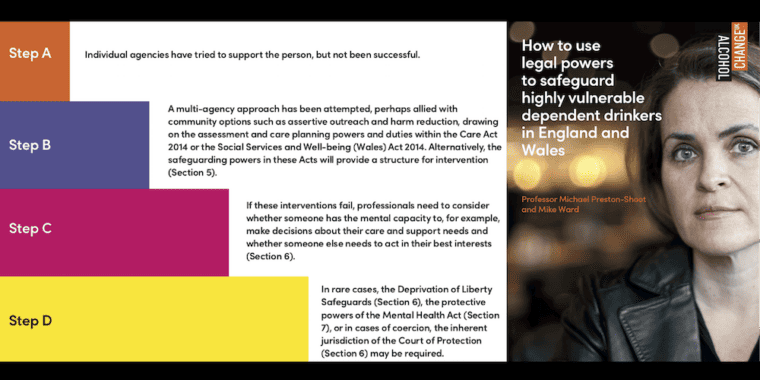
The issue we identified
In 2017, the Teeswide Safeguarding Adults Board published what is known as the Carol safeguarding adults review (SAR). This looked at lessons that could be learned from the tragic murder of a vulnerable, dependent drinker. It highlighted the need for improvements related to a number of aspects of her care, including issues about the use of mental capacity legislation and the use of safeguarding frameworks under the Care Act.
The Carol SAR is just one of a growing number of SARs that focus on vulnerable drinkers. In 2019, Alcohol Change UK reviewed 41 SARs to identify the role that alcohol played in the lives of these vulnerable people. The report, Learning from Tragedies, indicated that 25% of these serious safeguarding cases concerned dependent drinkers. This was a figure confirmed by a Local Government Association study published last year.
Our solution
As a result, over the past 18 months, Alcohol Change UK and I have been working with Professor Michael Preston-Shoot, and a network of local authorities and alcohol agencies across England and Wales, to develop a briefing: Safeguarding Vulnerable Dependent Drinkers. The briefing aims to enable professionals in England and Wales to use legal frameworks to manage and protect vulnerable, dependent drinkers.
This is an important missing piece in the jigsaw of care for this complex group of people. Its central focus is on the main legal powers which can protect vulnerable, dependent drinkers, and how these can be used to best effect: the Care Act (England), the Social Services and Wellbeing Act (Wales), the Mental Capacity Act and the Mental Health Act.
Alongside the central focus on legislation, it emphasises the importance of having systems and processes in place that enable the powers to be used most effectively. It also addresses the myths and misconceptions that hinder work with this group, and challenges the idea that these vulnerable people are choosing to live chaotic lives.
The briefing will be of value to staff in all services who work with people who are at risk of alcohol-related harm. This will include those in specialist alcohol services, as well as those working in health, social care, criminal justice, community safety, housing, homelessness, domestic abuse or other care roles.
We hope this briefing and the information that it highlights will be another important step in improving the care of the most complex dependent drinkers in the community.
Written by Mike Ward, Senior Consultant, Alcohol Change UK
All IAS Blogposts are published with the permission of the author. The views expressed are solely the author’s own and do not necessarily represent the views of the Institute of Alcohol Studies.
